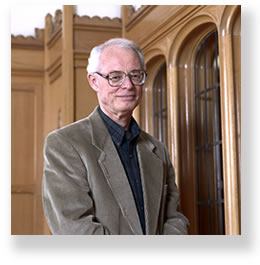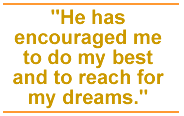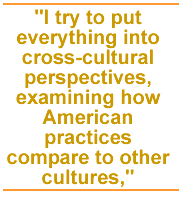
Distinguished Teaching Award

James Green
Jim Green took on an introductory anthropology course that nobody else wanted to teach and reinvented it. He developed a course about death for seniors that is one of the most popular courses on campus. He teaches graduate assistants how to reach undergraduates. And he does it with humor, imagination, and innovation. He was one of the first to integrate UWIRED in his courses and helped develop The Write Center to provide individual assistance on writing assignments.
His student evaluations are "routinely stellar," according to Eugene Hunn, acting department chair. "Above all, Jim Green is the brains, heart, and soul of ANTH 100, our keystone service course," Hunn says. "By my calculations, fully 25 percent of all UW graduates take this course."
Teaching introductory classes to 350 or more students from many majors is a challenging task that not many teachers relish. But Green says he enjoys it and tries to make it interesting for them.
"I deliberately try to recall how I felt as a freshman," says Green. "I try to tailor my presentation to what I think is on the minds of people 18 to 20 years old. It's like what you do as an anthropologist. When you do field research, you make yourself sensitive to what people are saying and how they're responding to you."

Before he began teaching it almost 30 years ago, Introductory Anthropology was a survey course that included a little archeology, a little linguistics, a little evolution, a little genetics—a smattering of all the sub-fields of anthropology. Green revamped it, using as a skeleton some of the interesting and controversial issues of our time that anthropology has something to say about. He begins with human evolution, then moves to race as a consequence of evolution, then the role of gender in different cultures, which leads to traditional family values and how they differ from culture to culture. The class finishes up with belief systems because, at that age, "students are rethinking what they were taught as they grew up," Green says. "We hit controversial topics all along the way. I try to give an anthropological viewpoint about them."
Punum Latha, a student in several of Green's classes, says "Dr. Green is one of the most amazing teachers that I am fortunate to encounter during my years at the UW. He has encouraged me to do my best and to reach for my dreams."
Discussion of controversy is an integral part of his classes, Green says, and "certainly shows up in my e-mail." He spends hours every morning answering e-mails from his students. Some are hostile and angry, and some express support for his ideas, Green says. What's most important to him is that students who won't speak up in his large classes feel comfortable expressing their views via e-mail.

Green's other claim to fame is his "Death Class." Spring quarter, 100 people took the class, and about 50 were turned away. Requests to be included in the class start coming in before Christmas, Green says.
Former student Michelle Barry says students are willing to sit on the floor or windowsills just to hear his lectures. "Every class was packed with people, had extremely high-quality discussion, lots of laughter, and a long line afterwards to talk with Professor Green. He was always patient, listened intently, and was gracious with his time."
The Death Class, which Green says he teaches in an up-beat manner, begins with a cartoon and includes visits to cemeteries and funeral homes, an autopsy, funeral customs of various religions, a talk from a hospice worker, a funeral school training film on embalming, and coverage of assisted suicide, cremation, ghosts, soul beliefs, near-death experiences, and an ancient custom called "second burial." At the end of the course, students are asked to write their own obituaries.
"I try to put everything into cross-cultural perspectives, examining how American practices compare to other cultures," Green says, admitting it is his favorite course to teach. He's writing a book based on his material, to be published by the University of Pennsylvania Press.
Green's love for all things anthropological reveals itself in all his classes. "It's my hope that my students, who think they understand an issue, will see it in a broader, more comparative perspective," he offers. "I hope they see that our own point of view is always relative to who we are, where we are, and when we are, and that other people have their own points of view for the same reasons."
As a senior lecturer in the Anthropology Department, Green is regarded as a workhorse, with half-again as many courses as regular faculty members. "The department is very committed to quality teaching and helped make this award possible by backing a senior lecturer on a long-term basis," he says.—Beth Luce